Research now backs up everything we geeks already knew: Gaming is GOOD for you! From improving your mental health, pain management, and even boosting rehabilitation after surgery, science is proving more and more how gaming has the potential to do great things for your health. The secret lies in “how” you self-medicate with games, both computer games AND tabletop.

Last year (Oct 2019), I presented a panel at PAX Australia, alongside three amazing professionals with plenty of experience and understanding in this exact field: Aleesha Shimeld (Registered Psychologist); Jaime Lawrence (Game Developer and former manager of Good Games Australia); and Pritika Sachdev (former Community Manager at CheckPoint). We had a lively discussion about the many ways gaming can help us, supported with research and examples from our own experiences.
Thanks to our participating audience, we came away with some great suggestions for games and how to make them work for our benefit. To be honest, we could have kept talking about this until late in the night but time constraints and scheduled travel arrangements said no. Instead, I have the opportunity to collate all of our discussion here, for those who want to check their notes, and those who wish they had been there–a common cry from PAX Non-Attendees.
Disclaimer: Yeah, it needs to be said. Please remember, this is NOT medical advice. If you feel or believe any of this may be relevant to you and your personal experience, please discuss all options with your medical advisor before making any changes to your current treatment and circumstances.

PAX Aust Panel: Gaming is Good for Your Health
Our panel was The Last Panel of PAX Aust 2019–Gaming is Good for Your Health: Self-Medicating With Games. The panel idea came from my own experience over the last 12 months, looking at how the use of games can be used to help overcome health issues. It was all focused on this real-life case study: a young teenage child who experienced a sudden yet chronic onset of high-level pain. At first, it was thought to be a passing virus. However, months have now passed, many school days have been missed, and numerous medical tests have left the teenager’s condition undiagnosed. While the medical profession continues to investigate, the teenager was referred to a therapist for additional pain management, mental health support, and to establish a gradual health rehabilitation program for the teenager to return to school.
And then the surprising part: The therapist suggested including GAMES as part of the treatment.
Now, before you go and jump on the PlayStation and smash out eight hours of Spider-Man, there is a level of understanding needed to make this work. Who here has had a “sick-day” and wanted to sit at home and play games? Yeah, me too. That’s been me for the last 12 months. However, there is a peak moment when the gaming helps us feel better and then the game just feels a bit… slovenly. The latter is what we want to avoid. So, let’s look at how we can make this work for us!
VR Games

Virtual reality is the most common gaming platform to be recognized as providing health benefits. There are amazing medical studies taking place right now, looking at the benefits of VR for dementia patients, physical therapy, and brain injuries such as stroke or trauma. It is now the most prevalent example given when showing how gaming can be good for you and subsequently the easiest example to see and give to make the point. Part of the appeal is the potential for VR to help patients recover lost physical abilities, with games specifically designed for rehabilitation.
These are not just your standard games. These are specific programs/games created on closed-loop, creating a controlled and safe environment for the user. A patient with dementia needs to keep challenging their brain to build neural connections. However, they can become quite overwhelmed when taken out of their safe environment. The ideal VR games are designed to keep patients in the sweet spot: challenged yet still rewarded. This applies to almost any situation. As humans, we need to come away from the experience with the feeling of accomplishment, like we actually DID something.
How we balance this will depend on our health requirements. As Aleesha pointed out during our PAX Panel, “It’s good to combine programs for physical and mental health but it is important to remember they can be different. For this particular case study, chronic pain management would potentially respond well with VR because one of the techniques for treating someone with chronic pain is to teach them to ignore the signals and focus on other things. Anything with mindfulness is great for chronic pain management. But for something like PTSD, it’s not really about managing the symptoms; there are different ways of approaching that. And using the game, all the time when you start to feel physiologically aroused or worked up, it could actually make your symptoms worse.” Essentially, rather than playing a first-person zombie-apocalypse VR game in a warehouse, you are better off trying a limited but immersive game.
If you’re not an injured person, you can gain benefits just from the physical movement but for the rehabilitation, it is always important that it is done under the care of a physician. If they say you need to be active 20 minutes a day without specific recommendation as to how you do it, then the real benefits come from what you enjoy.
Suggested games: Beat Saber—great physical workout as you swing a sabre to smash futuristic blocks. Alternatively, if you’re looking for an immersive creative experience, Minecraft VR is great for allowing a controlled escape from health-stress.
Standard Video Games
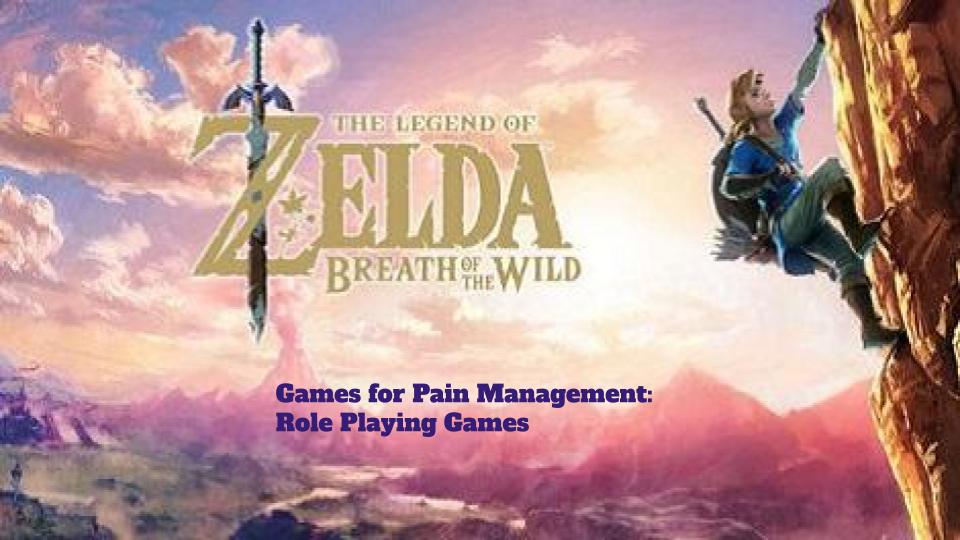
The next level of medical benefit from games is seen in direct Pain Management. Games, both computer and tabletop, provide a strong distraction from pain that can continue after the game has finished. RPG in both video and TT have received similar results in the level of distraction from pain and medical treatment, as do short-lived “easy-to-put-down” games like Candy Crush and Mini Metro.
No matter what the game is, if you are honestly using this experience for self-medication then there are rules you need to follow (as detailed by The Therapist for this case study):
- It must be cognitively engaging—with puzzles, strategy, or storyline.
- It must not be overstimulating or over-demanding in sensory experience.
- It must have regular “save points” or milestones so that you can limit your play, stop there, and be rewarded for your accomplishment. Ideally, this would allow up to an hour of game time for optimal benefits.
The best game we have found to fit all of these rules is The Legend of Zelda: Breath of the Wild. It has an open plan storyline so you can explore in a relatively peaceful way. It also has plenty of puzzles and challenges with shrines and side-quests. More importantly, BotW has many opportunities to set your own limit to play—e.g., Today I will explore this section and complete two shrines then stop. Or, today I will cook. That’s it. Simply, cook. The more recent Link’s Awakening is also beneficial in the same way, though there is some benefit lost if you are too frustrated with defeating a particular boss.
Fellow GeekDad Rory shared his experience using Skyrim to manage his PTSD; you can read his article here. For Rory, it provided a safe and controlled environment to manage his flight-or-fight responses. While Skyrim allows Rory to vent his anxiety and fear responses without real-world consequence, he is often left feeling exhausted and with a sense of being “unproductive.” When discussed during our panel, Aleesha said this is a normal response to the experience. “Gaming allows a very safe and controlled environment to test our responses. For people with heightened emotions or experiences, it can feel really good having a scenario release that energy. Some PTSD patients find value in situational therapy but I must stress how important it is to discuss this therapy with a trained specialist. You need to be aware of how to manage certain triggers or the experience will be more taxing rather than rehabilitating.”
Online Gaming Communities
The other side of computer games is the online social experience. Where some may hook up the Switch with the plan to escape their pain, online computer games also provide an opportunity for people to connect with friends despite mobility or accessibility.
Ironically, it was only last year when the World Health Organization (and many others) were pushing hard to classify “gaming” as an addiction. While our PAX Panel was well received, there were still many critics who considered any positive discussion to be reckless. The stigma of allowing a teenager to play computer games as “self-medication” was strong. Believe me when I say it was HARD writing this article.
And then COVID-19 hit and changed our world. As recently as last month, WHO has now thrown its support behind the gaming industry and its new initiative #PlayApartTogether. Although they are quick to clarify they support “active games,” the truth is that gaming has always had the potential to help. And yes, that means online communities as well.
CheckPoint is a non-profit organization based in Australia who provides mental health resources and support for the gaming community all around the world. It is run by both mental health and gaming industry professionals who have been working for many years to promote the benefits of gaming. One of the biggest areas they consider to be misunderstood is the benefit of online gaming and the “safe-space” it creates. Online gaming communities are often the first to be thrown under the panic-bus when mainstream wants to demonize computer games. However, Pritika from Checkpoint shared many examples of supportive communities accessed through CheckPoint. “If someone was having a really bad day, they knew they could go online to play with the same supportive team and either talk it out or smash it out in the game with support from others. Not everyone can go to the pub for a beer or a cafe for a cup of coffee. A safe space is what works for you. That can, and often does, include gaming.”
For me, this is one of the most overlooked and yet glaringly obvious benefits of gaming. When managed correctly, online computer games can provide a social environment that allows gamers to control their interactions and behavioral management. For example, the Autcraft community came together from the creation of a white-list Minecraft server. Originally started by Stuart Duncan, Autcraft was created as a safe place for autistic kids and their families to play Minecraft and meet online in a specific environment that catered for their specific needs. The server is administered by parents of autistic kids, and often autistic parents themselves. It is first and foremost for the kids, and it is a great example using online computer games as a health benefit for gamers.
GeekMom Dakster recently shared their own experience of playing Animal Crossing: New Horizons while managing their mental health. I have heard similar anecdotal evidence from friends who are playing AC: NH with online communities; many have said the online communities have helped manage their anxiety during the current COVID-19 self-isolation. While I haven’t played the game myself, I am happy to hear of people receiving positive benefits and support from their online gaming community.
Suggested Games: Breath of the Wild; Minecraft; Animal Crossing: New Horizons.
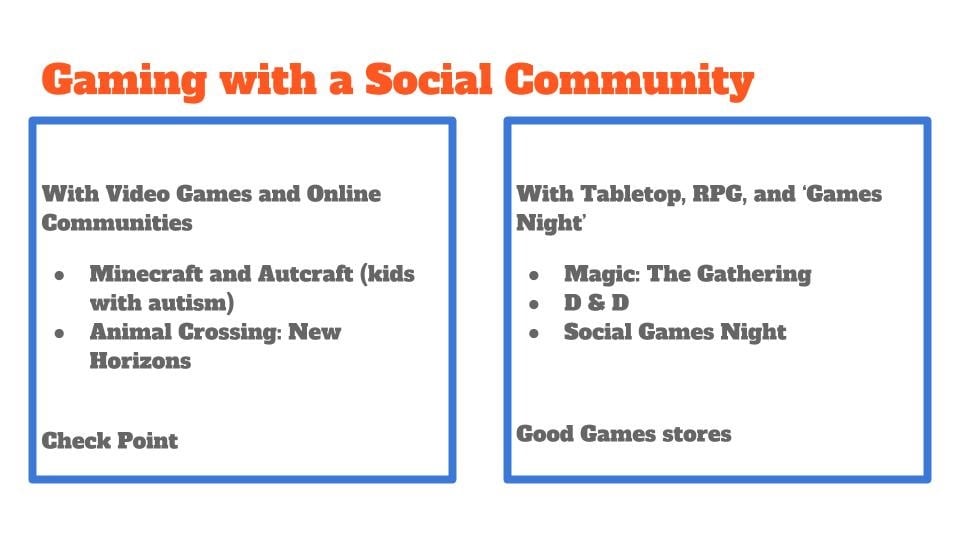
Social Benefits from Tabletop and RPG
Gaming is not just about computer games; while computer games are a lot easier to set-up and pack-down, tabletop games and RPGs (role-playing games) can come with an even greater social and immersive benefit. One of my favorite examples of social gaming is the collection of tables at any PAX event. The next best thing has been “Game Night” at home, or themed nights at my local Good Games store. I especially love the Good Games stores because they offer regular gaming meets, providing safe spaces for people to escape their demons for a few hours. This can range from Settlers of Catan to Magic: the Gathering.
Our fellow panelist, Jamie, shared a great story with us at PAX. Jamie has his fair share of tabletop experience, both personally and professionally (as a former manager of Good Games and a game developer). Jamie shared a story of one friend who attends his regular game nights. This particular friend experiences chronic illness and uses game night as an opportunity to escape, even if only for a short time. Jamie and his crew all know to watch for telltale signs of fatigue and pain in their friend. They all know when to ease up, take breaks, and call it a night. The surprising benefit came when they realized how some games benefited from them slowing down and appreciating a less intense approach. For the friend, this experience provides a greatly appreciated life-line to social interaction and game-play; for the friends, they benefit from different game play and stronger relationships.
This is the common element between online computer games and tabletop games: they are both equally empowered in fostering positive social environments. For people experiencing chronic illness, these social bonds can be life-saving. Sure, the escapism is obvious but to escape as a group is pretty awesome. It is also supportive knowing your band of adventurers is keeping an eye on you.
Dungeons & Dragons (DnD) and other RPG are tried-and-true games for self-medication, and that is not a surprise. However, it’s harder to find tabletop games you know you can play with friends who need a little more support. Munchkin Quest is a favorite in our family but I would not recommend it for this situation. The game is very intense and hard to take a break. Remember those rules from “using computer games to self-medicate”? The same rules apply to tabletop games. In the same sense, games like Pandemic and Forbidden Island are also not recommended. Co-operative games are usually great but the battle to “contribute” can be taxing on those with chronic pain and fatigue.
Suggested Games: Instead, look for games that allow a measured pace to conserve energy. Kingdomino works for us. As do Antidote, Settlers of Catan, Skyward, and Ecosystem. Another game recommended from the panel audience was Critical Core, a game funded through Kickstarter. It is a fantasy RPG tabletop game, designed with children on the autism spectrum. The game was developed by therapists and child psychiatrists as a tool to help develop social skills and help kids connect with others–parents, friends, and the world around them.
The First Step is Find Something You Enjoy
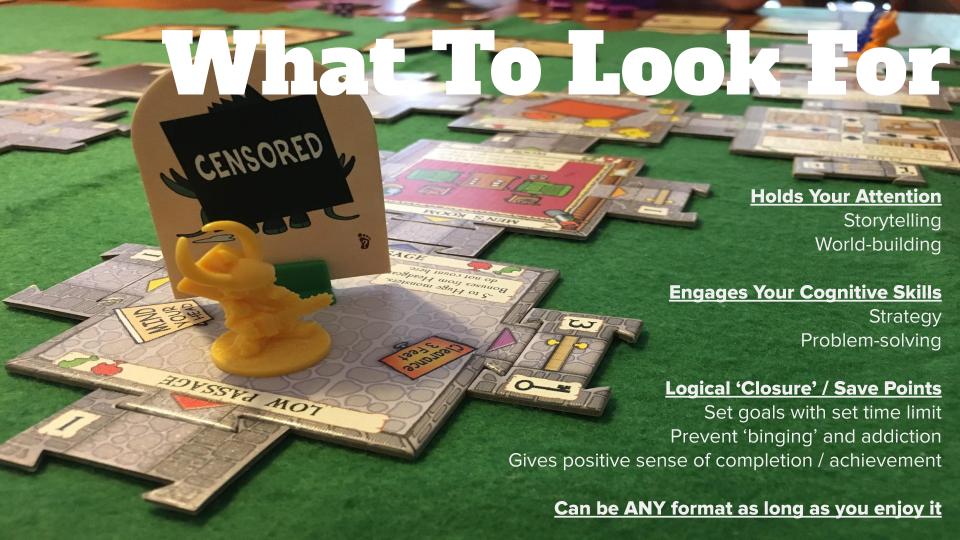
It is so easy to jump in this bandwagon and yell, “YES!! Gaming IS good for your health!!” but we both know that is not the entire truth. Instead, please use this article as a starting point in helping you. Remember: this is NOT medical advice. It is, however, a reminder for us all to find our own healing with the guidance of our medical advisors.
The first step is always to find something you enjoy. There is no point jumping straight into computer games if you have always preferred the feel of dice in your hand. The same goes for drawing up a character sheet in DnD when you need the visual cues of a video game. Start with what you know and work from there.
Be prepared to take your time on this journey. You may find the perfect game immediately, or it may be a surprise birthday present in 20 years’ time. And the perfect game right now may be unsuitable next year. It can change, just like you.
The most important thing to know is that there is nothing wrong using games to self-medicate. Nothing wrong at all. Yes, there are rules but rules are easier to work with than the guilt and stigma previously dished out. Be honest with yourself and your gaming habits. The benefits will come from that.
If you have favorites to add to our suggestions, please share them in the comments below. This is a safe place and we love gaming as much as you.
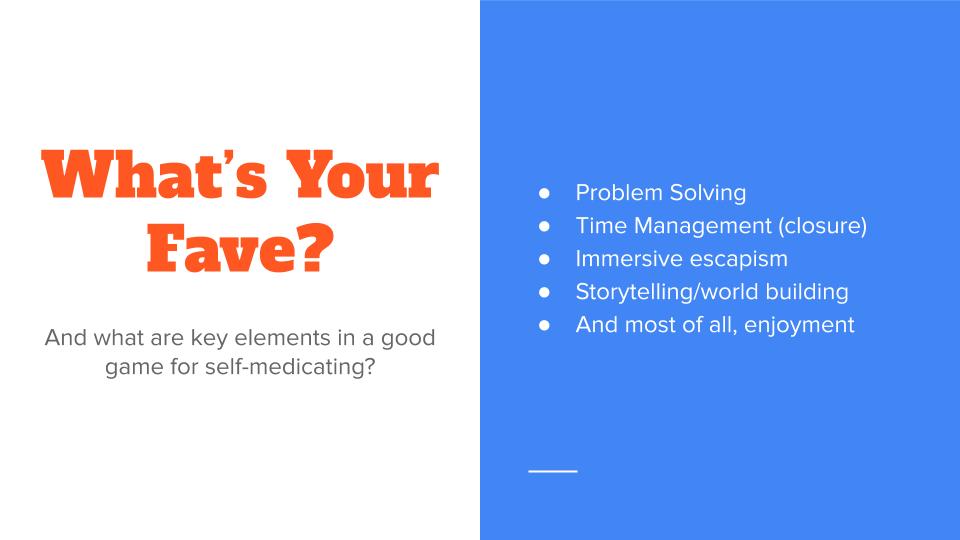
For further reading, check out Evil Genius Mum’s interview with fellow GeekMom Rebecca about the games and mental health in children.


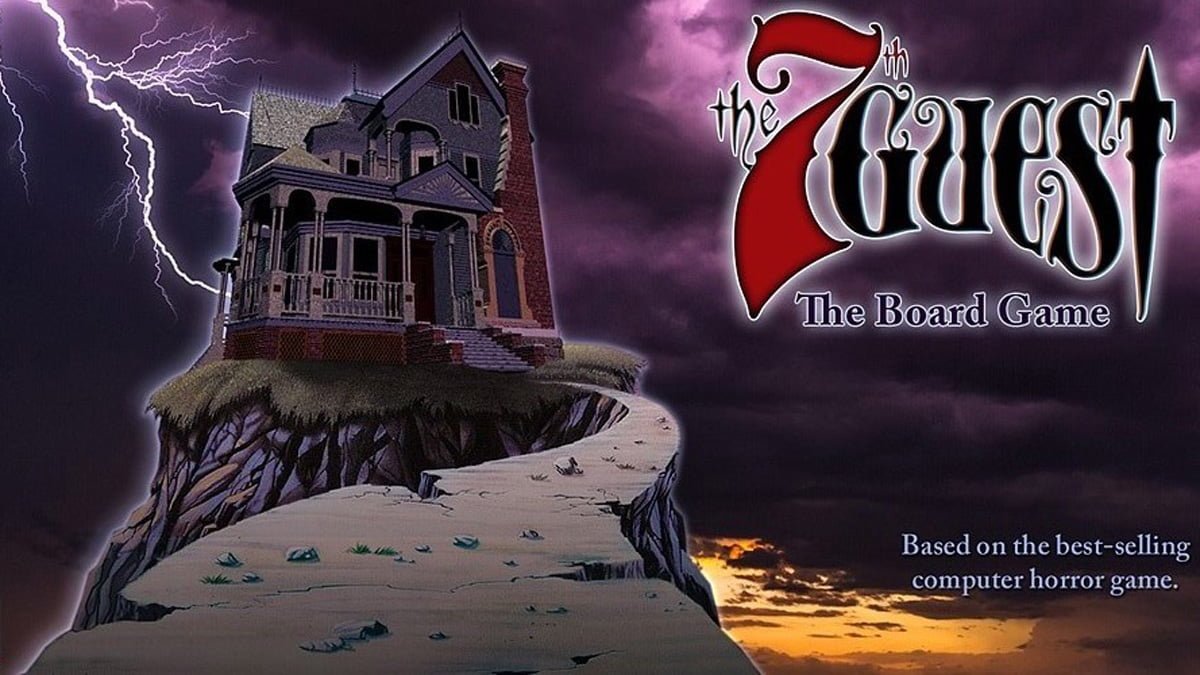
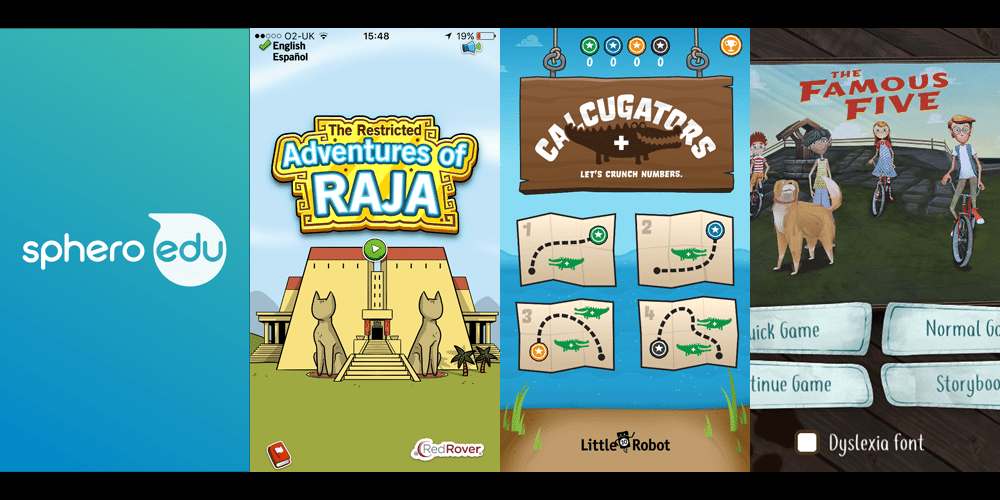

So play this game with your family.
Let i tell you, if you play too much (meal all day), you might become addicted, but that’s just me. As a human who might play a probably unhealthy amount of games, I can trustfully say that I consider myself more competitive than my friends. Also, I feel a lot more emotionally attached to games. That’s just me tho, no educated person.
I totally understand that. It is really easy to become dependent on the feedback we receive from games, both positive and negative. That’s why it is so important to set yourself boundaries while you explore “gaming with health management”. One of the biggest points mentioned above is finding a game has clear points where you can stop. Clear milestone markers and then you have to stick with this. BotW is a good example because you can set the limit: one shrine or one tower or one boss. And then STOP.
Extra note: pain medication, be it in the form of medicinal drugs or computer games or distractions or anything else, can quickly become a dependency. Even if you are using computer games as a distraction away from pain, you need to be aware of this and learn how to deal with it. This can happen really quick without you even realising it. Have a chat in the forums on CheckPointorg.com – they are Australian based by internationally available and can be really helpful in situations like this.
Also on my 2020 Steam wishlist: Papetura, Impostor Factory, Raji: An Ancient Epic and Mutropolis. The one I’m most excited about is Impostor Factory, the finale of the ‘To the Moon’ series.
Really interesting information, I am sure this post has touched all internet users. Thanks for sharing it.
easy to become dependent on the feedback we receive from games, both positive and negative. That’s why it is so important to set yourself boundaries while you explore “gaming with health management”. One of the biggest points mentioned above is finding a game has clear points where you can stop. Clear milestone markers and then you have to stick with this. BotW is a good example because you can set the limit: one shrine or one tower or one boss. And then STOP.
Extra note: pain medication, be it in the form of medicinal drugs or computer games or distractions or anything else, can quickly become a dependency. Even if you are using computer games as a distraction away from pain, you need to be aware of this and learn how to deal with it. This can happen really quick without you even realising it. Have a chat in the forums on CheckPointorg.com – they are Australian based by internationally available and can be really helpful in situations like this.
Hello everyone) I am with interesting information for you, once we all learned about the greatest CS game, and now the CSGO game comes out and the army of fans not only got stronger in spirit, but also found new fans of the game. CSGO is one of the most popular and favorite types of eSports where you can earn money – by placing bets. You can use one of the coolest CSGO betting sites here best csgo betting , they will teach you strategies, help you make a hassle-free gaming experience! So find out which CSGO betting sites are the best before you start betting. They must be licensed, with a good selection of matches, with bonuses, etc. You can also learn more about the different ways to bet on CSGO. For example, some CSGO betting sites allow for in-game weapon betting. I recommend it to everyone and wish you good luck!
Online FPS games also help in managing, coordinating, and playing with a team with unknown players. It accelerates your thought process and always preparing you for the next move.
Find out more of what are the free fps games you can play online to ease up your stress.
It depends on person to person, not all people perceive gaming in the same way.
One guy can play games just to chill, kill time, enjoy with their buddies without thinking much while some can play to improve themselves, assembling the best gaming set up to be the best in it, reciting the whole plan in their head while playing.
they play with some of the best gaming devices in the market just to have an extra edge over others.
I can say that games develop motor skills, coordination, attentiveness and concentration – but again, this depends solely on the person and his goals. You cannot take this as a panacea, you should always take care of your health with the help of certified specialists
It is really easy to become dependent on the feedback we receive from games, both positive and negative. That’s why it is so important to set yourself boundaries while you explore “gaming with health management”. CDDS